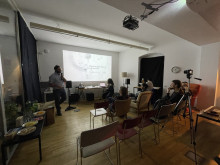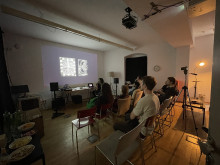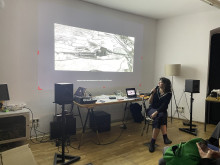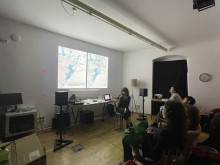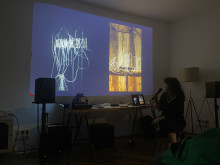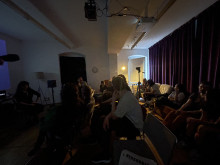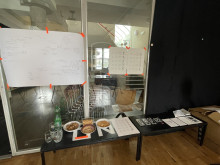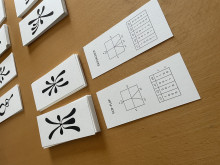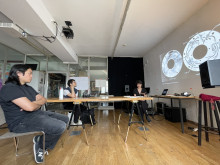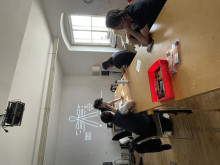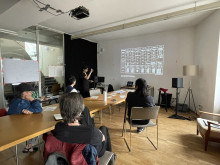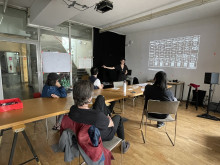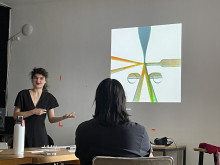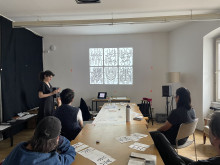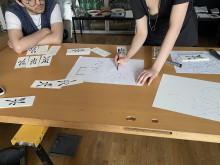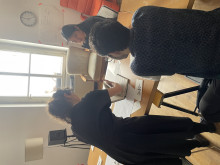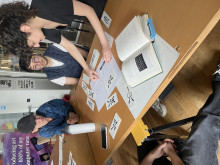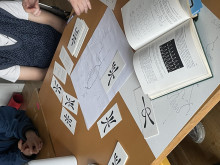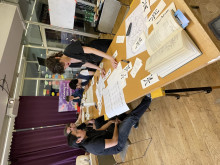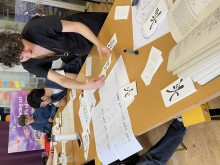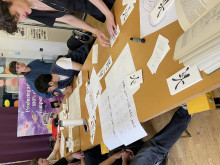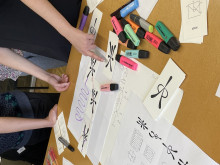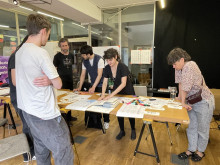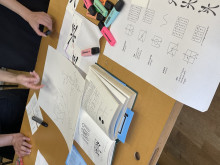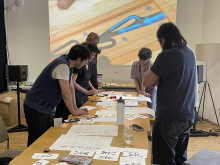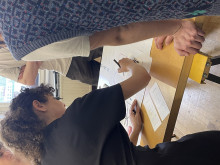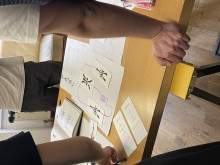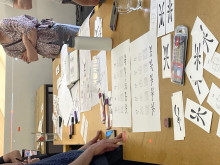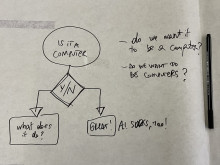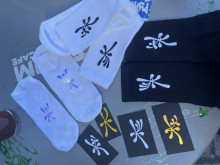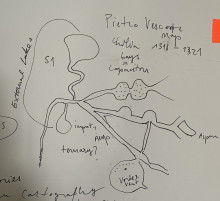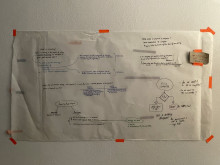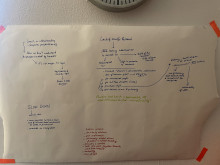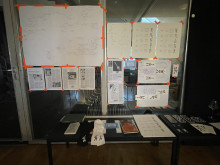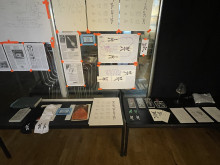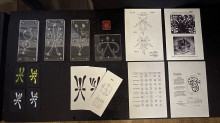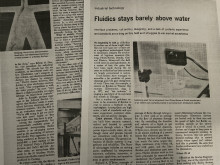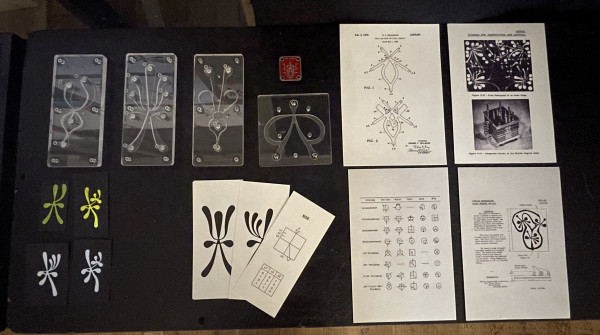
Fluidic Cookbook is part of the Research Labs 2025 programme organised and hosted by the servus.at association (Linz, Austria). The residency has two objectives: to produce a narrative structure and a note of intent for a future publication on the theme of fluidics, and to produce a prototype tool kit for learning fluidic logic.
The project is rooted in the research initiated by Ioana Vreme Moser in 2019 around fluidics as an alternative process to electronics, as an analogy to computer programming and more broadly to calculators, and as a divergent narrative from the dominant ones associated with technology. After 6 years of documentation and 3 artistic productions relating to this theme, she wishes to open up her research through a dedicated publication, written in collaboration with Diane Pricop, and complete the project with a workshop extension focusing on the practice of assembling her fluidic alphabet.
Together with artist Ioana Vreme Moser, we were invited by Davide Bevilacqua to take part in Research Lab 2025, a creative residency whose results will gradually emerge through a series of events taking place over the rest of the year and the following one, culminating in the Art Meets Radical Openness biennial planned for 2026. The theme proposed by the servus.at association this year is based on the ideology of slow-computing, an opportunity to explore fluidics from the angle of a technology that has disappeared because of a slowness deemed impractical and unproductive in the eyes of engineering.
During this residency, we revisited the principles of fluidics from a practical point of view, the history of this technology developed during the 1930s simultaneously between the USSR and the USA, and looked for examples of ancient mechanical processes powered by fluids (water or air) capable of executing a calculation in one form or another, between antiquity and the end of the industrial revolution. A number of conceptual questions have emerged from this research, which we have chosen to investigate, particularly in relation to media archaeology, cybernetics and de-archiving as a political act.
Ahead of the Research Lab, we agreed on the directions for this residency with Davide Bevilacqua and established a series of activities relevant to its smooth running:
1. The research itself
For this part, we began by drawing up an overview of the documentation already acquired and used by the artist, with a view to establishing our needs for the future. This involved putting diagrams on paper to highlight the points of convergence between the historical and technical aspects, which enabled us to create the connecting links between all these elements and to open up the reflection around the narrative framework of the publication. At the same time, we did a bit of research to fill in the gaps in the documentation, and in the interests of keeping to a human rhythm, we will be continuing this outside the dates of the residency. We also noted the questions raised by the public during recent exhibitions of Ioana's work, and our many discussions helped to establish a conceptual and critical common thread. The many meetings during the residency also raised new questions and relevant comments, giving us an idea of each other's perceptions, in other words, valuable information for adapting the written language.
2. A presentation of the artist and her project
In a spirit of openness to the public, the servus.at team organised a number of free events open to their community and that of the Stadtwerkstatt (STWST) - the association's premises, the home of the residency, and a hotbed of independent and socially engaged culture. Ioana's presentation, which took place on 16 April, describes her artistic approach through a brief history of her previous projects and some still in progress, right up to the moment when fluidics entered her world. She then gave a few historical examples to draw attention to the origins of technologies and complex mechanisms that are powered by water, before moving on to explain the processes used in fluidics, in particular the analogy with the operating system of electronics, and ending with the reasons why this technology was abandoned by the technical industries. Finally, she presented her fluidics projects - Fluid Memory (2019–2020), Fluid Alphabet (2022–2023) and Fluid Anatomy (2024–today) - tracing the progress of her research and her aspirations for future developments. The presentation ended with a Q&A session, an invitation to join the Open Labs over the following days, and a moment for informal conversation.
3. Two Open Labs
The Open Labs that followed the presentation were intended as a form of deepening the practice of fluidics, and an assessment of the understanding of an informed or uninformed audience, aimed at what a creative workshop might look like in the future. Treated as a pragmatic exercise, Ioana identified the fluidic shapes needed to create a potentially functional fluidic circuit, designed the corresponding schematic diagram accompanied by its name (NOR, AND, OSCILLATOR etc.) and its operating table. These were then printed on cards, like a game. The participants in the first Open Lab on 17 April were able to try to recreate a shift register together by assembling the right cards in a logic circuit. We were able to observe the degree of understanding of each person and collect feedback from each of them in order to improve the learning methods. On the following day (18 April), we deliberately left the Open Lab more open to debate and discussion, allowing us to gather points of view from individuals in the educational and scientific fields, and with it new references to study.
4. A podcast about the Research Lab
For the final stage of the residency, we were interviewed by Davide Bevilacqua for a podcast recorded using the channels and equipment of Radio FRO, another activist association and STWST resident. During the interview, Ioana gave a brief explanation of fluidics and her artistic vision, punctuated by sound interludes of her installations, and then we discussed the highlights of the residency, our respective perceptions and our future plans. Over and above the objectives set for this Research Lab, we emphasised the essential aspect of highlighting these forgotten technologies through storytelling, the importance of the role of artistic research in this approach, and the underlying political message it carries. But above all, we have emphasised the richness of the human aspect of this experience, in particular the difference in knowledge and experience between the artist, curator and other people involved, which can prove beneficial, even fertile, for the development of the project. Podcast link: https://cba.media/720402
In short, the Research Lab enabled us to explore the questions associated with the project, which do not necessarily require clear answers but rather the opening up of a dialogue between several modes of thinking, sometimes opposing, sometimes converging, but which always end up intersecting. The publication process is now underway, and will be punctuated by artistic events along the way. In the meantime, for more information about Ioana Vreme Moser's project, an updated version of our blog post Form For Fluid Computer was published in Versorgerin in March 2025.
Organisers : servus.at
Funded by: Jahresprogramm 2025 funded by Linz Kultur, Land Oberösterreich, and Bundesministerium für Wohnen, Kunst, Kultur, Medien und Sport.
Supported by : Goethe Institut & the EU via Culture Moves Europe
Residency Dates :
7 - 23 April 2025
Events :
Artist talk : 16 April 2025
Open Labs : 17 and 18 April 2025
Podcast : 22 April 2025
Location :
Clubraum, STWST, Linz, Austria
This project is supported by the Culture Moves Europe mobility programme : this work was produced with the financial assistance of the European Union. The views expressed herein can in no way be taken to reflect the official opinion of the European Union.

